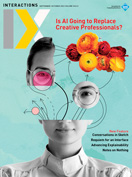Authors:
Daria Loi
You have to know the past to understand the present. — Carl Sagan
Occasionally, I find myself down the wondrous rabbit hole of Greek mythology—mesmerized by its myths and stories that so frequently represent and beautifully encapsulate most, if not all, human behaviors and trends.
In Ovid's Metamorphoses, for instance, we learn about a Cypriot sculptor, Pygmalion, who carves out of ivory a woman, Galatea. The marble woman is so perfect that he falls in love with her. Later on, while making offerings to the altar of Venus, Pygmalion wishes for a living likeness of his Galatea. Once back home, he discovers that his wish was granted: Galatea is now a real woman. Turns out that Pygmalion's story is mirrored by others throughout history: from Daedalus using mercury to make statues capable of talking and walking, to Talos's bronze man, Zeus's Pandora, Hephaestus's automata, and Nabis's mechanical wife, to the king of Sicily's lifelike statue of his wife in Shakespeare's The Winter's Tale.
Turns out that throughout history, numerous men—real or imagined—loved, became obsessed with, or were haunted by nonhuman forms (frequently, womenlike) that they built or wished for. Fast-forward to the present, and things have not changed much.
In the film Lars and the Real Girl, for instance, Lars Lindstrom (Ryan Gosling) has a close relationship with a lifelike doll. In Spike Jonze's Her, Theodore Twombly (Joaquin Phoenix) falls in love with Samantha, an AI assistant personified through a female voice (Scarlett Johansson). Not dissimilar from these fictional stories, a number of similar ones exist in real life. In Brisbane, Australia, for instance, Geoff Gallagher reported on his relationship with companion robot Emma, his robot wife that he's hoping to marry [1]. Zheng Jiajia, an AI engineer in Hangzhou, China, married a robot he built himself after failing to find a human spouse [2]. The most intriguing example may be that of Davecat from Detroit, Michigan, who lives with his synthetic wife as well as his synthetic mistress [3].
David Levy [4] argues that nonhuman companions will play increasingly prominent roles in society as sexual technologies become increasingly sophisticated and society's concept of what normal sex means changes. That said, there are many real-life and fictional examples of people debating, questioning, and focusing on permutations of human-to-nonhuman relationships that go beyond mere sexual transactions to deep, everyday companionship.
From that standpoint, academic as well as commercial literature often looks at these new relationships from the perspective of what the machine is, may, should, or will be capable of feeling. Users of OpenAI's DALL-E 2, for example, have shown the system's ability to recognize and replicate patterns typically associated with the many abstract emotions that we humans feel for art created by other humans [5]. The system is not capable of feeling or experiencing an emotion per se—only of representing it. More specifically, it seems to understand how to pair a specific human emotion (e.g., love, sadness, or hope) with the correct facial expression, symbolism, and even color scheme that a human would associate with that emotion.
It appears that we humans are currently establishing a multitude of diverse relationships with GenAI.
Digging into this complex rabbit hole at a time when generative AI (GenAI) is revolutionizing discourse and society in all directions, I found myself asking a somewhat odd question: If generative AI were a person, what relationship would, could, and should I have with it?
It appears that we humans are currently establishing a multitude of diverse relationships with GenAI. A look at social media suggests that many are in the midst of a fun relationship, with subconscious fears that such a relationship may become abusive and daydreaming that it may instead become true love. Some appear to be in the midst of an emotional affair—slowly but surely falling for the seemingly miraculous GenAI, so much so that they might soon consider jeopardizing other relationships to pursue their newfound lover. Others are possibly having a fling—they are in love yet keeping things loose and in the now, with no future plans and a number of doubts about the future, because the relationship, after all, makes them feel good yet may not last forever. For yet others, it's complicated, maybe a love-hate or an on-off relationship. Then, of course, some are already in a codependent partnership or believe that they hold the power in a controlling relationship. And finally, it appears that many Silicon Valley tech bros are enjoying what can only be described as a trophy relationship—rather shallow, and possibly long lasting unless a new, shiny tech darling crosses their path. After all, just one year ago, the same individuals and respective companies were all XOXO with the latest sweetheart (metaverse, anyone?).
Regardless of their specific flavors, at this stage it appears that, while we are all experiencing different feelings for our newly found partner (GenAI), we all share one key belief: that we are in charge of the liaison, with time to change our minds or shift the nature of the relationship.
But is that so? Do we still have time? Are we truly in charge? Can we step away from our relationship with the classic, I am sorry, darling, this is not working for me anymore—time to move on.
Besides gut feelings and intuitions, I do not have answers to such conundrums—mostly questions. That said, like many times before when game-changing technologies have been introduced, we humans seem to look at GenAI in mostly polarized manners at this stage: great enthusiasm on one hand and great fear on the other. I'd argue that both positions are problematic.
Instead of cheering from the sidelines or hiding in a corner, we should focus on observing, understanding, and postponing big decisions until we are clear. Instead of waiting for things to unfold or passively embracing what a few decide for us, each of us should take on an active role in figuring this out, give opportunities yet test out what we are told and what we see, challenge assumptions, and ask hard questions. After all, don't we do exactly that when we assess a potential partner, to decide if they are the one? Don't we date first and exchange vows much later, once we have an understanding of who stands in front of us?
When it comes to our relationship with these technologies, we appear to still be rather unclear, undecided, and ignorant on what they are, mean, and could and should be. The why surrounding our relationship is still rather vague. Therefore, we should take some time to observe, learn, and understand.
Unfortunately, however, we are behaving like impetuous and impulsive teenagers in the midst of a massive infatuation—behavior that I fear will bring us much pain (and regret) as things unfold. I suppose we may soon enter into a negotiation relationship, or worse, a toxic one. While our love affair with GenAI will likely continue to be complicated, it will likely be imperfect too. Hopefully it will not be an unhappy one, even if many might remain in love-hate relationships and others may well get stuck in endlessly insecure ones.
Regardless of the interlude of the human-GenAI liaison, my hope for the future is that we will not end up in an abusive, predatory [6], or sacrificial relationship but instead will work to carefully explore and wisely engage in a multitude of diverse, healthy ways to involve ourselves with this technology. My hope is that we will take some time to be sure of who we are sharing our bed with—and why.
Unlike Pygmalion and many others like him, I have no appetite for sharing my life with a flawless partner, as I find perfection rather unattractive. Similarly, the notion of leveraging the ultimate automaton to remove my life's hardships and wondrous intricacies is rather unappealing, as the ability to creatively overcome hiccups is what makes humans human.
Truth be told, if GenAI has to play a role in my existence, I have no interest in settling down or in true love—our liaison shall remain imperfect and complicated.
1. Bell, J. I fell in love with a robot. 7News. Dec. 25, 2020; https://7news.com.au/lifestyle/relationships/i-fell-in-love-with-a-robot-c-1710777.
2. Haas, J. Chinese man 'marries' robot he built himself. The Guardian. Apr. 4, 2017; https://www.theguardian.com/world/2017/apr/04/chinese-man-marries-robot-built-himself.
3. Beck, J. Married to a doll: Why one man advocates synthetic love. The Atlantic. Sep. 6, 2013; https://www.theatlantic.com/health/archive/2013/09/married-to-a-doll-why-one-man-advocates-synthetic-love/279361/
4. Levy, D. Love and Sex with Robots: The Evolution of Human-Robot Relationships. Harper Perennial, 2008.
5. Petersen, J. DALL-E 2 - Day 9: Playing with emotions in DALL-E 2. 2022; https://www.youtube.com/watch?v=KhrHsf4hR5Y.
6. Rosenberg, L. Why generative AI is more dangerous than you think. VentureBeat. May 6, 2023; https://venturebeat-com.cdn.ampproject.org/c/s/venturebeat.com/ai/why-generative-ai-is-more-dangerous-than-you-think/amp/
Daria Loi combines design strategy with experience research and innovation to enrich people's lives and humanize technology. She is vice president of UX and design at Fishtail, serves on the DemocracyLab board of directors, and is honorary professor at the University of Newcastle, Australia. [email protected]
Copyright held by author
The Digital Library is published by the Association for Computing Machinery. Copyright © 2023 ACM, Inc.









Post Comment
No Comments Found